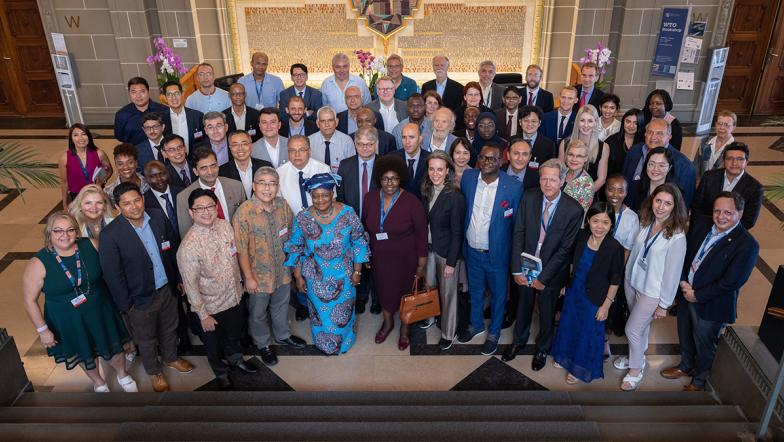Chairs Programme Conference concludes with call for enhanced cooperation with policymakers

The WTO Chairs Programme (WCP) concluded its three-day annual conference on 27 July, wrapping up fruitful discussions on a wide range of trade-related issues, including sustainable trade, outcomes reached at the 12th Ministerial Conference (MC12), future research priorities, training and outreach, and opportunities for collaboration within the WCP network and with policymakers.
From 25 to 27 July, a series of panel discussions and roundtables took place to discuss MC12 outcomes, in particular the decisions on the WTO's response to the COVID-19 crisis, the TRIPS waiver, food security and the Fisheries Subsidies Agreement.
At a dialogue session with WCP Chairs and Academic Advisory Board members, Director General Ngozi Okonjo-Iweala laid out how new research projects could be developed to facilitate implementation of MC12 outcomes. The Director-General suggested that Chairs from countries with COVID-19 vaccine manufacturing capacities explore ways to help their governments foster the supply of vaccines to countries in need. The Chairs also have an important role to play in helping countries bring the Fisheries Subsidies Agreement and other MC12 results into effect and in providing new ideas for negotiators to tackle unsolved issues on overfishing and overstocking, she said.
At a session titled "Mapping WTO Membership Priorities", the Chairs and Board members met with WTO ambassadors from various regions, including the Latin American and Caribbean Group (GRULAC), the African, Caribbean and Pacific countries (ACP) Group, the African Group and the Small, Vulnerable Economies (SVEs) Group to discuss members' priorities for research, customized training and targeted outreach.
Dr Okogu Bright, WTO Chief of Staff, pointed out the importance of direct communications between the Chairs and policymakers. "Through this programme, Chairs provide topical research and advice to stakeholders both within their countries and regionally. The perspectives which they bring enable members to negotiate based on research which is customized to members' domestic and regional needs. But in order to truly fill these gaps in information and fulfil the goals of the programme, clear and direct flows of feedback are required between policymakers and Chairs," he said.
Ambassador Oudot de Dainville from WCP lead donor France moderated a joint session with the Aid for Trade Global Review. At this session, the WCP Chairs shared case studies of some projects, including a project on gender and trade jointly implemented by the WCP Chairs from Barbados, Chile and Mexico and projects on circular economy, small business and pandemic recovery implemented by Chairs in Indonesia and Mauritius. The Ambassadors from Barbados, Indonesia and Kenya discussed how these projects fostered inclusive, empowering, resilient and sustainable trade and the issues relevant to developed and least-developed members.
Ms Sarah Ahn, Director-General of the Ministry of Foreign Affairs of the Republic of Korea, praised the achievements of the Chairs' projects. She said: "Because of its confidence in the vision and potential of the WCP, Korea has decided to join several other countries in supporting the programme as its latest donor." The case studies are available here.
In closing the conference, Deputy Director-General Xiangchen Zhang thanked participants for their active engagement over the previous three days. He reiterated the DG's call for the Chairs to further develop their research, outreach and training activities in line with the current trade environment and to enhance their cooperation with policymakers and other stakeholders in their regions.




